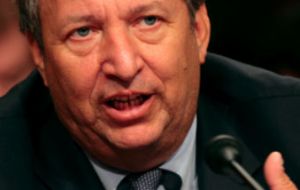MercoPress. South Atlantic News Agency
White House defends stimulus plan in spite of soaring unemployment
 Economic advisor Lawrence Summers says job creation will peak at the end of 2010
Economic advisor Lawrence Summers says job creation will peak at the end of 2010 United States President Barack Obama's 787 billion US dollars stimulus package is working, top White House economic adviser Lawrence Summers insisted on Friday. And although unemployment is a “major area of concern”, Mr Summers said rising joblessness does not prove that the stimulus “is falling short”.
The effect of the stimulus on jobs will peak at the end of 2010, he said.
Continuing to stimulate the economy takes precedence over cutting America's growing deficit, Mr Summers added.
“We were at the brink of catastrophe at the beginning of the year, but we have walked some substantial distance back from the abyss,” Mr Summers said in a speech at the Peterson Institute for International Economics in Washington.
To support his conclusion, Mr Summers pointed to surveys showing that a majority of businesses now expect the market to improve.
He also said that a number of private forecasters are predicting positive GDP growth in the US second half of 2009.
“It is true that unemployment is substantially higher and job loss has been greater than most observers predicted last winter, and that unemployment is likely to rise in the coming months,” Mr Summers admitted.
”But contrary to a significant amount of commentary, this does not provide a basis for concluding that the (stimulus package) is falling short of its goals,“ he added.
The White House projected that ”only a very small part of the total job creation expected from the stimulus would take place by the end of the second quarter (of 2009),“ he explained.
”Given lags in spending and hiring, the peak impact of the stimulus on jobs was expected to be achieved at the end of 2010.“
Mr Summers dismissed concerns about the rising deficit, and rejected the claim that government stimulus spending could trigger a damaging inflationary spiral.
”The greatest risk to future US deficits would be uncontrolled economic contraction in the United States,” he maintained. (BBC).-




Top Comments
Disclaimer & comment rulesCommenting for this story is now closed.
If you have a Facebook account, become a fan and comment on our Facebook Page!